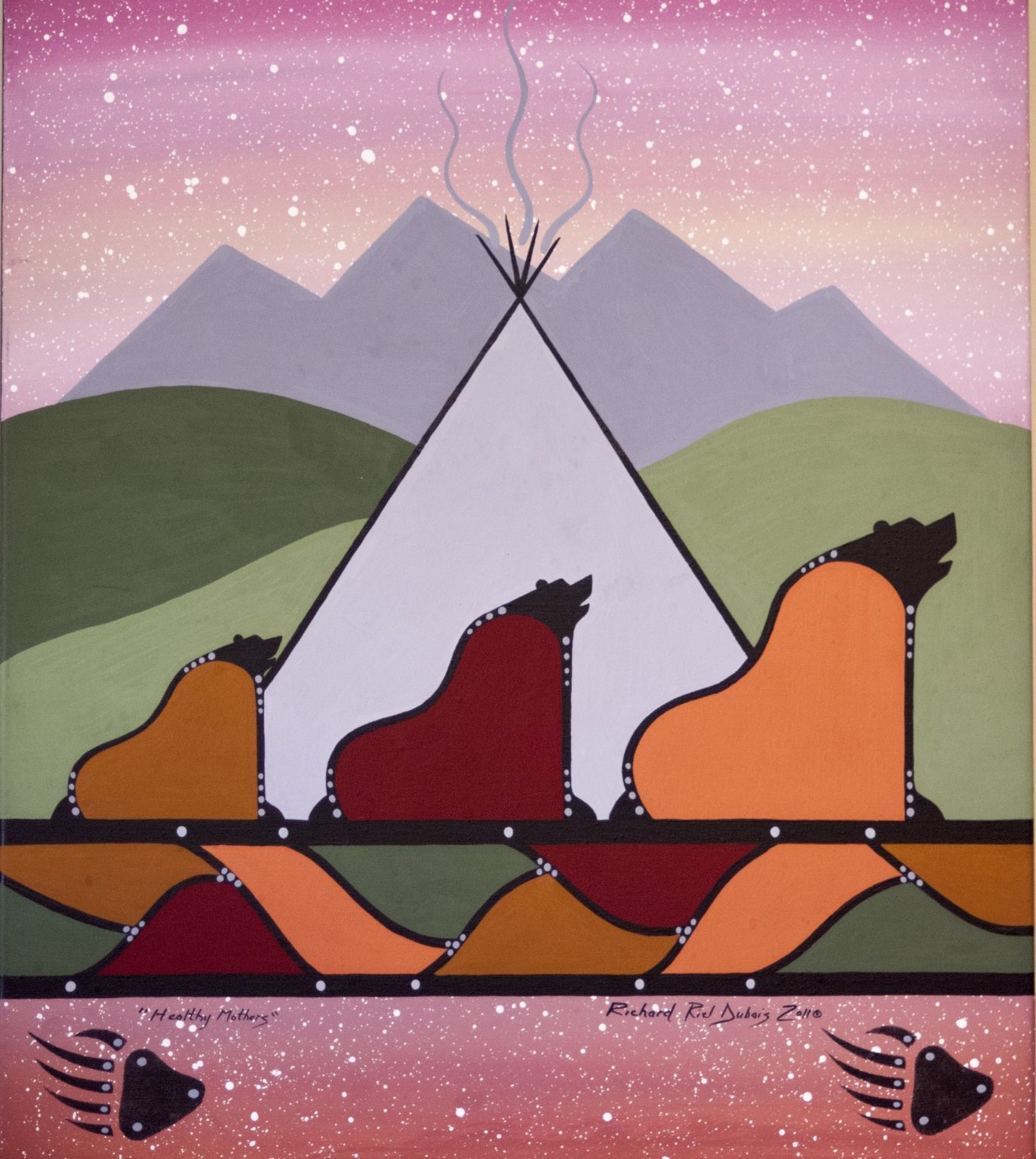
“Healthy Mothers” by Richard Riel Dubois Zollo is displayed at Closer to Home’s Pekewe House.
“I grew up an only child,” says Sarah*, reflecting on the bond she now sees between her two young daughters; a bond she never experienced. “The love that they have is so sweet.”
Nearly four years ago, Sarah was referred to Closer to Home’s (CTH) Healthy Families program by a health nurse when she was pregnant with her first child. She was scared and unsure of her ability to parent. She had never pictured herself becoming a mother, but it was about to happen.
“I remember thinking, ‘How am I supposed to be a good mom?’” she says. “I guess I’ve always had that little bit of personal doubt, like ‘Am I doing this right?’”
Sarah had a difficult relationship with her mother growing up, and felt disconnected from her Cree heritage. “I still have a lot of anger towards my mom for the way she raised me,” she says. “But I knew that I didn’t want my daughter to feel the way that I felt towards my mom. So I try to be a good mom for her and give her the love that I didn’t have.”
Marion Redwood, a Home Visitor with CTH, worked closely with Sarah, teaching her about child
development and slowly helping her improve her self-confidence. “She was already doing a lot of the things we teach, like positive parenting,” says Marion. “She just needed some reassurance.”
After the birth of her daughter, Sarah struggled with postpartum depression and anxiety. She felt alone and it was often difficult for her to leave the house. She had gone from working and going to school, where she was always surrounded by people, to being at home with her daughter every day with nobody else to spend time with.
It took some time and personal growth to form a bond with her new baby, learn to love herself, and fall into the role of being a mother.
Marion would make weekly visits to check on baby and make sure mom was doing okay. “Sometimes I would be having a bad day,” Sarah remembers, “but then after Marion came, I felt better. She was always encouraging me and giving me information. After she would leave, I’d think ‘okay, I know I can do this.’”
Marion and the Healthy Families team worked with Sarah for three years, eventually discharging her from the program and connecting her with Marsha Hanson, Facilitator of CTH’s Kiwehtata program. Now, she regularly attends cultural events and workshops, and has built a solid network of support in her community.
“I don’t really have a lot of other Indigenous aspects of my life,” Sarah says. “It’s nice to have other people who are part of my culture and who understand what I’m going through.”
Sarah says that growing up, she wasn’t as connected to her culture as she wanted to be, and felt like she didn’t have an identity. “But now that I’m a mother,” she says, “I feel like I have a place where I belong.”
“Being connected to my culture and having that spiritual background, I know that I’m not alone,” she says.
“If I ever feel uncertain, I know I can smudge. I know that I have the grandmothers behind me. I have a community that comes with the spirituality, and people like Marsha and Marion.”
Sarah still struggles with leaving the house sometimes, but she says it helps to have programs like Kiwehtata to come to. “When I come here,” she says, “Marsha always makes me feel better. She gives me the support I need to know that I’m doing okay. That it will all be okay.” “This is like my little safe haven where I can be closer to my culture without any negative aspects,” she says. “I feel really safe and welcomed here.”
Marsha lights up talking about Sarah. “To see the growth in her and how she parents her kids is phenomenal,” she says. “If there’s a word I can use about Sarah, it’s that she’s very present. She lives in the moment.”
Sarah says learning that it was okay to ask for help was a turning point for her. “I realized that asking for help isn’t a weakness,” she says. “It makes me stronger. Ever since I started asking for more help, I find that I’m able to be more patient. I’m a better parent, a better partner and a better friend.”
“I don’t think I would be the mother I am if I didn’t have the support from Closer to Home,” she says. “Just knowing that I can come here – Marsha and Marion are friends, and they’ll always be here to support me. I know that I have them in my life.”
*Name changed to protect privacy

